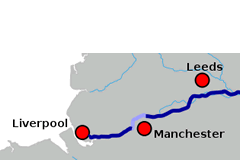The strategic economic plan recently produced by Leeds is evidence that innovative, entrepreneurial and deliverable policies can emerge from regional agencies – but equally demonstrates the frustration that Northern city leader’s face when trying to implement positive change.
An executive summary of the Leeds city region document can be read here and it is clearly an ambitious, realistic strategy that articulates the huge opportunities and potential of Leeds and its surrounding areas. It is a plan strengthened because of the broad support it has from an increasingly cohesive, co-ordinated public sector and a private sector that is keen to see economic growth accelerated.
In recent weeks there has been much talk about the growing North-South divide. To address that unhealthy chasm then, government should welcome and back ideas such as getting on with HS2, investing in major infrastructure improvements, building more housing and making Leeds an IT and digital centre of excellence. But more than this, Westminster needs to give the city region the tools to get on with the job.
Funding for transport projects, allowing Leeds to retain the receipts from the disposal of HCA assets across the city region, allowing the newly established Combined Authority to recover VAT and returning revenue funding to the Local Growth Fund are all reasonable asks that the government should agree.
Without these relatively minor changes at central government level, without a degree of decentralisation of finance, decision making powers and responsibilities, and without a recognition that Leeds knows what is best for Leeds, then this impressive plan will only be partially delivered – and that economic imbalance between North and South will get worse rather than better.







